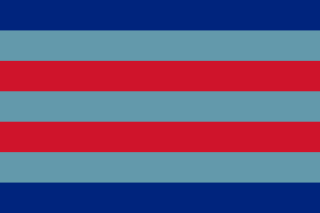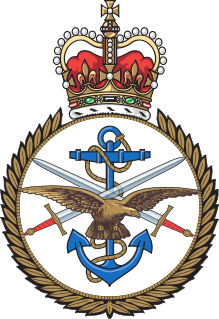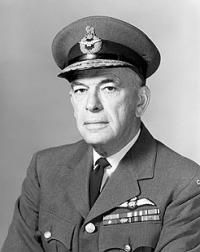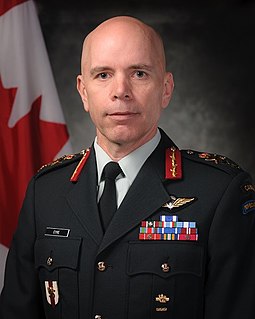
The Canadian Armed Forces is the unified military of Canada, comprising sea, land, and air elements referred to as the Royal Canadian Navy (RCN), Canadian Army, and Royal Canadian Air Force (RCAF).

The Ministry of Defence is the British government department responsible for implementing the defence policy set by Her Majesty's Government, and is the headquarters of the British Armed Forces.

An aide-de-camp is a personal assistant or secretary to a person of high rank, usually a senior military, police or government officer, or to a member of a royal family or a head of state.
A commander-in-chief or supreme commander is the person who exercises supreme command and control over armed forces or a military branch. As a technical term, it refers to military competencies that reside in a country's executive leadership, a head of state or a head of government.
The title chief of staff identifies the leader of a complex organization such as the armed forces, institution, or body of persons and it also may identify a principal staff officer (PSO), who is the coordinator of the supporting staff or a primary aide-de-camp to an important individual, such as a president, or a senior military officer, or leader of a large organization.

Air chief marshal is a four-star air officer rank which originated with the Royal Air Force, where it is the most senior peacetime air force rank. The rank is also used by the air forces of many countries that have historical British influence and it is sometimes used as the English translation of an equivalent rank in countries which have a non-British air force-specific rank structure. An air chief marshal is equivalent to an admiral in the Royal Navy or a general in the British Army or the Royal Marines. In other forces, such as the United States Armed Forces and the Canadian Armed Forces, the equivalent four-star rank is general or admiral.

The minister of national defence is a minister of the Crown in the Cabinet of Canada responsible for the management and direction of all matters relating to the national defence of Canada.

The Norwegian Armed Forces is the military organisation responsible for the defence of Norway. It consists of four branches, the Norwegian Army, the Royal Norwegian Navy, which includes the Coast Guard, the Royal Norwegian Air Force, and the Home Guard, as well as several joint departments.

The Chief of the Defence Staff is the professional head of the Canadian Armed Forces. As the senior military position, the Chief of the Defence Staff advises the minister of national defence, the prime minister and Cabinet. The role is a Governor in Council appointment made on the advice of the Prime Minister.

The Chiefs of Staff Committee (CSC) is composed of the most senior military personnel in the British Armed Forces who advise on operational military matters and the preparation and conduct of military operations. The committee consists of the Chief of the Defence Staff who is the chairman and professional head of the forces, the Vice-Chief of the Defence Staff, who is the vice-chairman and deputy professional head of the armed forces. The Committee also consists of the professional heads of each branch of the armed forces: the First Sea Lord and Chief of the Naval Staff, the Chief of the General Staff and the Chief of the Air Staff.

The Chief of the Army Staff is the head of the military staff of the Indian Army and the chairman of the Indian Army Board. The Chief is usually the highest ranking officer of the Indian army unless the Chief and Vice Chief of Defence are army officers. The position is abbreviated as COAS in Indian Army, and is always held by a full general. The general is responsible for directing and chairing the army staff of the armed forces serving as the staff's chief executive. As the most senior officer to serve in the Indian Army, the Chief of the Army Staff is a military adviser to the Government of the Republic of India and the Ministry of Defence. The current COAS is General Manoj Mukund Naravane, who took office on 31 December 2019.

Air Chief Marshal Frank Robert Miller was a Canadian airman, the last Chairman of the Chiefs of Staff in 1964, the first Chief of the Defence Staff from 1964 until 1966, and Deputy Minister of National Defence. He held a range of Air Force training appointments during World War II.

The commander of the Canadian Army is the institutional head of the Canadian Army. This appointment also includes the title Chief of the Army Staff and is based at National Defence Headquarters in Ottawa, Ontario.

The Joint Chiefs of Staff Committee (JCSC), ; is an administrative body of senior high-ranking uniformed military leaders of the unified Pakistan Armed Forces who advises the civilian Government of Pakistan, National Security Council, Defence Minister, President and Prime minister of Pakistan on important military and non-military strategic matters. It is defined by statute, and consists of a Chairman, the military chiefs from Army, Navy and the Air Force: all four-star officers appointed by the President, on the advice of the Prime minister. The chairman is selected based on seniority and merit from the Chiefs of service of the three branches of the Pakistan Armed and Defense Services. Each service chief, outside their Joint Chiefs of Staff obligations, performs their duty directly for the Ministry of Defence.

The Music Branch is a personnel branch of the Canadian Armed Forces (CAF). It is primarily composed of band musicians, and also deals with the selection and musical training of its recruits. The branch encompasses all the military bands in service in the Canadian Armed Forces. It is roughly the equivalent to the Royal Corps of Army Music (CAMUS) in the British Army.

The Chief of the Defence Force (CDF) is the highest-ranking and most senior military officer in the Australian Defence Force (ADF) and is the principal military advisor to the National Security Committee and the Minister for Defence. The current Chief of the Defence Force is General Angus Campbell, who took office on 6 July 2018.

The Chief of the Air Staff is the head of military staff of the Indian Air Force. The CAS is the leader of the governing body of the Air Force, and is usually the highest ranking officer of the Air Force unless the Chief of Defence Staff of the Indian Armed Forces is taken as an officer of the aerial branch of the armed forces. The position is abbreviated as CAS in the Indian Air Force cables and communication, and is always held by a full Air Chief Marshal since 1966. The chief is directly responsible for leading the Indian Air Force as the chief military adviser on aerial affairs. They are responsible for coordinating and chairing the military air staff of the Air force and ultimately are subject to the Chief of Defence and the government of India.

The Ministry of Defence (MoD) is charged with coordinating and supervising all agencies and functions of the government relating directly to national security and the Indian armed forces. The President of India is the ceremonial commander-in-chief of the armed forces of the country. The Ministry of Defence provides policy framework and resources to the armed forces to discharge their responsibility in the context of the defence of the country. The Indian Armed Forces and Indian Coast Guard under the Ministry of Defence are primarily responsible for ensuring the territorial integrity of India.
A four-star rank is the rank of any four-star officer described by the NATO OF-9 code. Four-star officers are often the most senior commanders in the armed services, having ranks such as (full) admiral, (full) general, colonel general, army general, or in the case of those air forces with a separate rank structure, air chief marshal. This designation is also used by some armed forces that are not North Atlantic Treaty Organisation (NATO) members.

The Chief of Defence Staff of the Indian Armed Forces (CDS) is the head of the military staff of the Indian Armed Forces and the chief executive of the Department of Military Affairs. As the highest-ranking serving officer in the Indian Armed Forces, the CDS is the commanding officer and chairperson of the Joint Commanders and Staff Committee – making him the chief military adviser to the government of India and the Ministry of Defence. As the professional head of the armed forces, the Chief of Defence Staff is also aided by the newly formed office of Vice Chief of Defence Staff, the nation's second highest ranking military officer, and the three chiefs of staff of the army, navy and air force, who are the leaders of each respective branch. The first and current CDS is General Bipin Rawat, who took office on 1 January 2020.

















